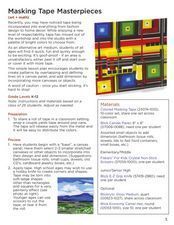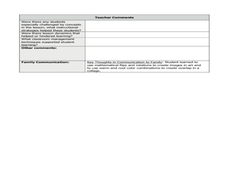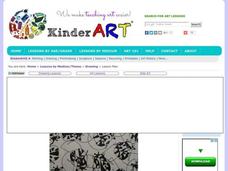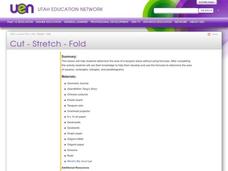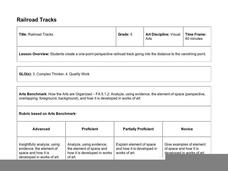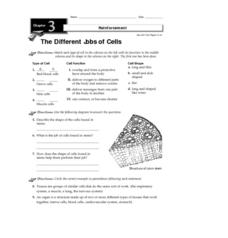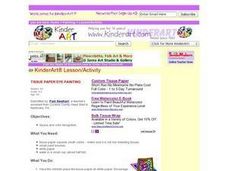Curated OER
Woodlands Ribbonwork
Learners make art based on the ribbon work of the Woodland Indians. Background information on the art form and procedure are laid out in an easy to follow step-by-step format.
Curated OER
Shaping the View: Symmetry and Balance
Students explore the symmetry and balance in the composition of a variety of art works and note how the viewer's eye is guided to the important components of the image. How these elements affect the tone of the painting and communicate...
Curated OER
Terrific Tessellations
Students create, transform, and critique their own piece of artwork. In doing this lesson, students get more experience working with angles, lines, and measurement. They gain experience seeing, and creating their own patterns and shapes.
Curated OER
Puzzling Shapes
In this math instructional activity, students count the number of rectangles and triangles they see in two drawings. Each figure has overlapping shapes.
Curated OER
Lengths, Areas and Shapes - Week 9
In this lengths, areas and shapes worksheet, students explore overlapping and non-overlapping patterns. They identify the number of objects in a pattern, determine how the pattern may be folded to create additional patterns, and...
Common Core Sheets
Determining Rectilinear Area
Third graders find the area of rectilinear shapes by partitioning them into two non-overlapping rectangles and adding the areas of the non-overlapping parts together. It allows learners to recognize area as an additive.
Center Science Education
Paleoclimates and Pollen
Demonstrate for your earth scientists how plant pollen of the past has become part of sedimentary deposits, providing clues about ancient climates. Then give them simulated sediment layer samples to analyze for different types of paper...
J. Paul Getty Trust
Expressing Emotions through Art Lesson 3—Everybody Works Together
See how art can communicate the idea of working together with your class. They will view art and describe space, color, shape, and lines in art. Then they will overlap in their art to show a sense of space. In the end, they will be able...
Curated OER
Masking Tape Masterpieces
Young scholars create non-objective art based on the design elements of line, color, balance and movement using tape. This simple lesson plan encourages students to create patterns by overlapping and defining lines on a canvas panel. One...
Curated OER
Geometric Collages
Fourth graders investigate the concept of geometric patterning. They create their own patterns with a few basic requirements. The patterns must illustrate the concepts of flipping, 90 and 180 degree rotations. The collages also consist...
Curated OER
Positive/Negative Bugs
Bugs can be creepy - and fun! Kids create a positive and negative design by repeatedly drawing a simple insect overlaid with a geometric shape. The outcome is really neat and will help build spacial reasoning, visual acuteness,...
Curated OER
Area of Tangram Pieces
Mathematicians calculate the area of a tangram piece without using formulas. They use a geometry journal to record activities during this instructional activity. They make a set of tangrams and use them to...
Alabama Learning Exchange
Abundant Area
Explore the relationship between perimeter and area. Learners input the area and perimeter for shapes on the Shape Explorer website, solve problems using geoboards, complete a worksheet, create a PowerPoint presentation, and take an...
Hawaiʻi State Department of Education
Railroad Tracks
Ahhh the vanishing point! Sounds ominous, but it's not. Fifth graders analyze the use of perspective in Renaissance art. They practice using linear perspective to draw railroad tracks that seem to go on forever. Tip: Make this...
Curated OER
The Different Jobs of Cells
In this cells worksheet, students review different types of cells including their different functions and shapes. This worksheet has 6 matching and 3 short answer questions.
Curated OER
Shaping the View: Symmetry and Balance
Students examine how artists structure their compositions to convey a sense of symmetry and balance. They analyze various paintings, identify objects and figures in the paintings, conduct Internet research, and evaluate paintings.
Curated OER
Shaping the View: Symmetry and Balance
Young scholars view an image from the Metropolitan Museum of Art and identify the focal point of the painting. They discuss symmetry and balance as it pertains to the images. Students use the Student LaunchPad (linked to this lesson) to...
Curated OER
Design Space
Students will develop an understanding design space. The arrangement of shapes is taught to create simple perspective. The differences in the size of shapes is shown in order to help learners see how they should be arranged in...
Curated OER
Line and Shape Game
Students create a picture of an actual scene or overlap the called out lines or shapes into a space-breaker. If someone calls out a line or shape a student had not planned to use in the art, they have to figure out some way to use it...
Curated OER
The H Puzzle
In this puzzle worksheet, students determine how to transform six shapes into a symmetrical capital letter H. Students may rotate and turn the pieces but must not overlap them.
Illustrative Mathematics
Counting Squares
Challenge young mathematicians' understanding of squares with this geometry puzzle. The task is simple, identify as many squares as possible in a 3x3 array. Allow learners to work independently or in pairs as they search for squares,...
Curated OER
Informed Drawing Through Observation
Students practice observation techniques to improve their drawing skills. In this drawing technique lesson, students assess drawing as an art media and discuss realism. Students view examples of animal drawings and practice drawing using...
Curated OER
Tissue Paper Dye Painting
Use tissue paper squares to create collage art. Young artists discuss colors as they place and glue each piece of tissue on the paper. Tip: Cut out large basic shapes instead. Have the class create images using the tissue...
Curated OER
Understanding Topographic Maps
Underclassmen create a cone-shaped landform and then draw a contour map for it. Then they examine a quadrangle (which was easily located with an online search), and relate it to what they experienced. The accompanying worksheet is...










